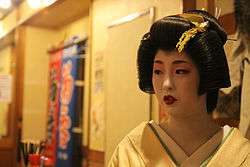芸子
Japanese
| Kanji in this term | |
|---|---|
| 芸 | 子 |
| げい Grade: 4 |
こ Grade: 1 |
| jūbakoyomi | |

芸子 (geiko): a geiko or geisha in Kyoto.
Etymology
Compound of 芸 (gei, “art, arts, especially performing arts”) + 子 (ko, “child, small thing, junior”).
Pronunciation
Usage notes
For the sense of a woman employed to wear traditional dress and entertain using traditional song, dance, music, and storytelling:[2]
- geisha is the most general term.
- geigi is most often used in writing, typically more formal writing.
- geiko is more common in the Kansai region of Japan.
- kirei-dokoro can be used to mean a beautifully dressed woman, but more often refers to a woman working as an entertainer in a red-light district.
- hidarizuma is a somewhat old-fashioned epithet for a geisha, referring to the way that geisha hold onto the left (hidari) edge below the collar portion (tsuma) of their kimono while walking.
Synonyms
References
- 2006, 大辞林 (Daijirin), Third Edition (in Japanese), Tōkyō: Sanseidō, →ISBN
- 1988, 国語大辞典(新装版) (Kokugo Dai Jiten, Revised Edition) (in Japanese), Tōkyō: Shogakukan
This article is issued from
Wiktionary.
The text is licensed under Creative
Commons - Attribution - Sharealike.
Additional terms may apply for the media files.